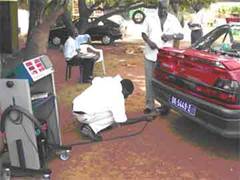The problem
In 1998, an international framework was established to improve air quality in Sub-Saharan Africa. The first regional conference was organized by the World Bank on June 26th, 2001 in Dakar, Senegal, to discuss the issue of leaded gasoline as a major source of emissions in traffic-heavy towns and cities in developing countries. The harmful health effects of lead exposure in children, such as brain and nervous system damage, prompted the "Dakar Declaration." This was a joint effort by the World Health Organization and 25 sub-Saharan countries, the oil industry, civil companies, and other international agencies to eliminate leaded gasoline by December 31, 2005.As part of this project, Blacksmith Institute helped the state Environmental Department and AfricaClean (a local air quality monitoring group) to design and implement a monitoring routine for vehicle emissions. The result was to improve emissions standards and overall air quality.
Health Impact
Air pollution in Dakar, the capital, is a source of concern for local authorities. Large quantities of atmospheric pollutants emitted by vehicles had posed serious environmental and public health problems, especially for the most vulnerable population: children, pregnant women, and people with respiratory diseases such as asthma, pneumonia, and tuberculosis.Current Activity
A gas/diesel vehicle analyzer in a vehicle service centers will be used to gather data on pollutants. Following this initial assessment, a National Committee of government and industry representatives used these findings to discuss fines as a method of enforcing existing air quality standards in Dakar.Outcome
Gasoline sampling results showed that lead was still present in Senegalese gasoline after the ban, but that levels varied across different times and areas. Most importantly, lead content in gasoline in the capital, Dakar, was much lower--and 75% of all cars in Senegal are located here. Overall, lead levels in gasoline decreased between September 2006 and March 2007.Average gas levels were reduced from over 800mg/l pre-2002 to .0001 mg/l by March 2007.
Additionally, atmospheric lead levels decreased in all towns observed, to the point that all are now significantly lower than the WHO recommended safe level (0.5 ug/m^3). These results demonstrate that lead emissions from vehicle gasoline combustion dropped significantly, and that the lead phase-out program in Senegal has been successful overall.
Trace amounts of lead are still present in stains on gas tanks that were not properly cleaned after the phase-out. A technical committee should determine the viability of using catalytic converters to reduce the emissions output of cars that violate air quality standards (such converters do not function when the vehicle runs on leaded gas, and so they would have been completely useless before the 2005 phase-out).
This air pollution project should be an introduction to more far-reaching initiatives that will seek to transition the diesel buses in Dakar to compressed natural gas or liquefied natural gas fuel. Natural gas bus conversion programs such as those in Mexico City, Bangkok, Cairo, and Beijing will be used as models.
Data File
Pollutants:
Particulates, Lead, Air Pollution
Location:
Dakar,
Senegal
Transmission:
air
Source:
Transportation
Report Type:
Project
Project Status:
Ongoing Project
Pollution Status:
Nominator:
AfricaClean


